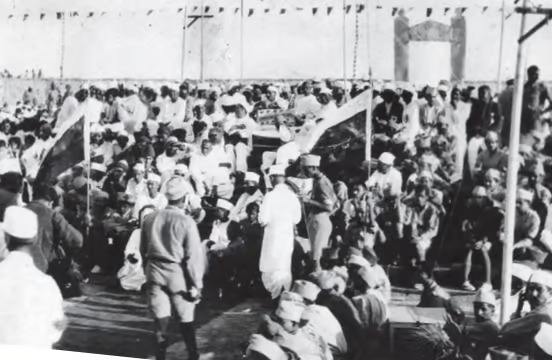Karachi Session of INC: A Turning Point in India's Independence Struggle
History Indian HistoryPosted by NewAdmin on 2025-02-10 09:09:26 |
Share: Facebook | Twitter | Whatsapp | Linkedin Visits: 88

The Karachi Session of the Indian National Congress (INC) was held in March 1931, during a pivotal period in India's struggle for independence. The session took place shortly after the signing of the Gandhi-Irwin Pact, a significant agreement between Mahatma Gandhi and the British government that had led to the suspension of the Civil Disobedience Movement. The Congress, under Gandhi's leadership, had agreed to a temporary truce with the British, and the Karachi Session was one of the first major political events after the agreement.
At the session, the Congress formally endorsed the Gandhi-Irwin Pact, which had promised several key concessions from the British, such as the release of political prisoners and the allowance for salt production for personal use. The agreement was seen as a diplomatic victory for the Congress, even though it did not grant full independence to India. The session also marked a turning point in the relationship between the Indian National Congress and the British government, as the Congress was now willing to engage in further negotiations with the British, including the participation in the Second Round Table Conference, which was to be held later that year in London.
One of the most important resolutions passed during the Karachi Session was the adoption of the Congress's objectives, which emphasized not only the goal of achieving complete independence for India but also the need for social and economic reforms. The session passed resolutions that focused on issues such as the protection of religious and cultural freedoms, the promotion of social justice, and the protection of minority rights. It also affirmed the Congress's commitment to non-violence and civil disobedience as the core principles of its struggle for independence.
The Karachi Session was a historic moment in India's independence movement, as it showcased the Congress's ability to adapt to changing political circumstances while remaining committed to its long-term goal of independence. It also marked a significant shift towards social and economic issues, with Congress leaders recognizing the importance of addressing the needs of the common people, including issues related to poverty, education, and inequality. The session was thus a critical step in the evolution of the Indian National Congress as a political force, both in its fight for political freedom and its vision for a more just and equitable society.
Search
Categories
Recent News
- Bengaluru Metro's Pink Line Expansion: A Breath of Fresh Air for Commuters
- Ghana's Youth Drug Crisis: A National Tragedy
- India's Services Sector Soars: A Boost for the Economy
- Gold Bond Investors Face New Tax Reality
- Bengaluru Colleges Face Uncertain Future: The Looming Fee Hike Crisis
- Anna University Convocation: Minister's Absence Sparks Speculation
- GATE 2026: Countdown to the Crucial Exam
- Sisters' Tragic Fall: A Shocking Wake-Up Call for Ghaziabad